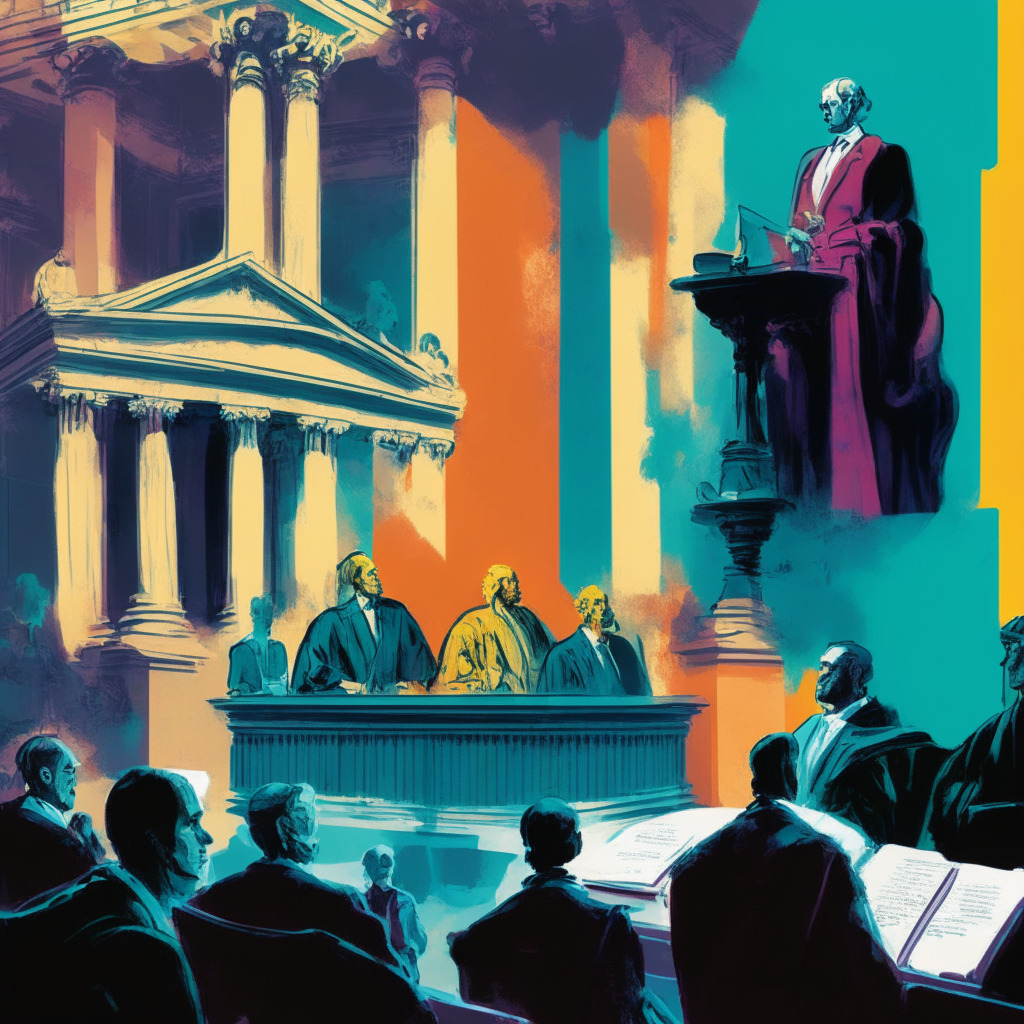“Binance is under scrutiny for potential ties with five sanctioned Russian banks, raising questions about compliance and potential sanctions violations. Critics claim Binance facilitated ruble trades and peer-to-peer transactions with these banks. However, Binance denies these allegations, stressing adherence to international sanctions rules.”
Search Results for: Financial Services Agency
UK’s Cold Calling Ban Debate: A Front Against Crypto Scams or Threat to Lawful Operations?
The UK is considering a clampdown on cold calling in financial services, a move hailed as protection against digital asset scams, but may hinder companies relying on this practice. Furthermore, the government, while combating fraud, pledges support for blockchain, seeking to balance consumer protection and fostering industry growth.
Exploring Bitcoin-Backed Real Estate Investments in the Cayman Islands: An Innovative Strategy or a Risky Gamble?
Bitcoin financial services firm, Ledn, introduces a new pathway for Bitcoin-backed loans to invest in Cayman Islands’ real estate. This synergy between the digital economy and real estate could allow investors to leverage their BTC holdings as collateral, potentially gaining permanent residency if investments exceed $2.4 million. Concerns remain over BTC’s market volatility and its potential impact on these investment schemes.
Navigating the Minefield: US Crypto Tax Propositions Spark Heated Debate
Coin Center, a cryptocurrency advocacy group, has suggested the U.S lawmakers to consider potential taxation legislation for digital assets. Proposals include a De Minimis exemption for promoting crypto transactions and redefining the IRS’s understanding of a broker to explicitly exclude cryptocurrency miners and lightning node operators.
Anatomy of a Crypto Clash: Gemini’s Battle with The SEC Over Unregistered Securities
“The SEC alleges Gemini’s Earn lending program and MDALA constituted unregistered securities sold to investors, sparking a legal battle that underscores crypto asset regulatory stalemate. This tussle further highlights emerging legal and financial ambiguities looming over the evolving crypto sector.”
Stellar Foundation’s Unprecedented Investment in MoneyGram: A Leap or a Stumble?
Stellar Development Foundation becomes a minority investor in MoneyGram International, deviating from the norm. ZetaChain closes an equity funding round, aiming to simplify asset and data management across multiple blockchains. Adidas and BAPE merge fashion and NFTs.
Regulatory Shift: The Stifling or Stability of Cryptocurrency in U.S. Banking
“The U.S. FDIC’s latest risk report indicates a shift from previously indifferent stance towards considering cryptocurrency as an area of concern. The 2023 Risk Review shows FDIC’s readiness to initiate discussions with banks about crypto-asset activities, echoing similar sentiments across U.S. banking agencies. Yet, it also reveals the complex balancing act required in integrating digital assets safely into the conventional banking system.”
Unmasking Crypto’s Theatre of Absurd: Decentralization Illusion vs Real World Application
“Crypto appears to be an elaborate facade, with skepticism regarding the authenticity of use-cases. The recent market trends unveiled progress, while also revealing the failings of DeFi and Web3. Governance systems are under scrutiny, and real economic activity seems sidelined for speculation. However, a genuine decentralised future remains the goal.”
Redefining Boundaries: SEC, Coinbase Lawsuit, and the Call for Crypto Regulation Reformation
U.S. Senator Cynthia Lummis and crypto experts assert that the SEC’s examination of crypto trading platforms, like Coinbase, as unregistered securities exceeds their jurisdiction. The SEC’s authority question, they believe, should rest with Congress. Much debate exists around immediacy and breadth of crypto regulation, with an emphasis on establishing comprehensive, globally mindful approaches to build trust in the market.
Navigating Innovation and Regulation in Crypto – A Global Odyssey
“The Argentine Agency for Access to Public Information is investigating Worldcoin’s data collection practices; Canadian authorities aim to improve storage of seized digital assets including NFTs; Coinrule recently launched its Marketplace driven by Generative Models. This crypto evolution requires a balance between innovation and regulation.”
Unleashing the Legal Maelstrom: Crypto, Global Adoption and Regulatory Upheaval
“Crypto platform, Binance, moved to dismiss a lawsuit by the US Commodity Futures Trading Commission (CFTC), challenging its jurisdiction over non-US entities. Meanwhile, the US Senate sanctioned the 2024 National Defense Authorization Act, targeting crypto mixers, trading bodies, and ‘anonymity-enhancing’ coins.”
Crypto Regulatory Tug-of-War: An Analysis of Recent Developments & Legislative Initiatives
Senator Jack Reed introduced a bill to strengthen Know Your Customer and Anti-Money Laundering regulations within decentralized finance. Meanwhile, two House committees proposed a bill to clarify regulatory authorities’ jurisdiction over digital commodities. Despite opposition, these developments highlight the need for clearer DeFi regulations and could shape its future trajectory.
Indonesia’s Leap into Digital Assets: Boon or Bane for Its Crypto Economy?
“Indonesia has launched its own digital assets stock market and clearing house, marking a significant leap in fostering a fair and secure crypto trading realm. Despite delays, this platform holds the potential to transform Indonesia’s crypto landscape. However, regulatory intricacies remain a challenge. Indonesia’s bold move has positioned it globally as a fast adopter of crypto assets, promoting cryptocurrency acceptance and making it an attractive hub for digital assets.”
Bittrex Inc. vs the Florida OFR: Navigating regulatory hurdles in Crypto’s Future
“Bittrex Inc., a crypto exchange, faced several allegations including mixing customer assets with the firm’s capital and neglect of maintaining a surety bond, leading to its bankruptcy filing. With regulatory scrutinies and legal battles, the crypto future is filled with complexities and regulatory challenges.”
Exploring the Paradox: Reserve Bank of New Zealand’s Views on Cryptocurrency
The Reserve Bank of New Zealand (RBNZ) is taking cautious approach towards crypto-assets, expressing concerns over consumer protection and potential commercial or regulatory barriers. However, ambiguously, the concept of Central Bank Digital Currency (CBDC) has caught its interest, despite its declaration not to replace physical cash.
Hong Kong’s Virtual Asset Index: Boon for Crypto Adoption or Gateway to Volatility?
Hong Kong rating agency HKVAC announced its virtual asset index, including Bitcoin, Ethereum, and the largest 30 cryptos. This follows HSBC’s support for trading BTC and ETH futures ETFs, potentially driving mainstream adoption, yet also raising concerns about volatility, risk, and regulatory scrutiny.
Binance vs SEC: Court Denial in Gag Order Bid & What It Means for Crypto Sphere
A U.S. District Court denied a motion to stop the SEC from issuing public statements about Binance’s ongoing legal case, filed by the legal teams of Binance, Binance.US, and CEO Changpeng “CZ” Zhao. The lawsuit alleges unregistered securities offerings to U.S. customers, while Binance faces regulatory hurdles in Europe. The case’s outcome and its potential impact remain undetermined.
South Korea Travel Ban & Crypto Fraud: How It Affects the Blockchain Industry
South Korean prosecutors enforce a travel ban on officials from Haru Investment, Delio, and B&S Holdings amid fraud investigation, while US law enforcement tackles bomb threats demanding $5,000 in bitcoin. Meanwhile, Gemini permits withdrawals to Voyager Digital bankruptcy victims, and Binance reverses plans to delist privacy coins in Europe.
Navigating the Supervisory Void: The Need for Clear Regulations on Digital Assets and Banking
Federal Reserve Governor Michelle Bowman warns about the “supervisory void” in the digital assets landscape, leaving financial institutions in uncertain territory. She urges global regulators to pay attention to novel banking activities and develop a clear regulatory framework. Lack of clarity risks pushing businesses towards crypto-friendly jurisdictions and may have serious consequences for financial institutions and stability of the digital asset market.
Binance’s Kazakhstan Launch: Embracing Regulation or Escaping Scrutiny?
Binance has launched a regulated cryptocurrency exchange in Kazakhstan, offering users various crypto and fiat-focused services. Amid growing regulatory troubles for Binance in the West, this move raises questions about whether established crypto players will continue seeking crypto-friendly jurisdictions or if regulatory bodies will adapt to accommodate the rapidly evolving industry.
Coinbase’s Global Super-App Vision Amid SEC Lawsuit: Opportunities & Challenges
Despite facing a recent SEC lawsuit, Coinbase CEO Brian Armstrong envisions the exchange as a global “super-app” driving the Web3 economy. This decentralized app could revolutionize finance and digital asset interactions but may face regulatory scrutiny, potentially hindering its growth and impact on mainstream blockchain adoption.
US Political Divide on Crypto Regulations: How it Affects Investors and Companies
Without bipartisan support for digital asset-focused legislation, investors and companies may turn to crypto-friendly jurisdictions, warns Moody’s. Key differences include stablecoin regulation and consumer protection, with many crypto firms already exploring options outside the US.
Nigeria’s SEC Crackdown on Binance & US Regulatory Battle: What it Means for Crypto’s Future
The Nigerian SEC ordered a cease and desist notice against Binance Nigeria Limited, a “scam entity” claiming association with Binance. This development occurs amidst regulatory scrutiny in Nigeria, lawsuits in the US, and ongoing legal battles between exchanges and regulatory agencies, raising crucial conversations about the future of the crypto market.
BUSD Market Cap Plummets: The Impact of Regulatory Scrutiny on Stablecoins
Binance-branded BUSD stablecoin’s market cap has dropped to $4.3 billion, falling behind DAI, due to regulatory actions against Paxos, the issuer of BUSD. Stricter regulatory measures led Paxos to end its relationship with Binance, impacting the stablecoin’s market position.
Wyre Shuts Down: Is the Bear Market to Blame or Lack of Adaptability? Pros and Cons Explored
Crypto payments platform Wyre is shutting down after nearly ten years, attributing the closure to financial challenges instead of regulatory issues. The company experienced setbacks, including a failed acquisition, withdrawal limits, and layoffs, highlighting the importance of adaptability and resilience in the volatile crypto market.
Digital Asset Market Structure Draft: Striking the Balance Between Regulation and Growth
US House Financial Services Committee Chair Patrick T. McHenry announced a vote on the Digital Asset Market Structure Discussion Draft to classify cryptocurrencies as securities or commodities and regulate exchanges. However, concerns arise due to potential “provisional registration” that could reward bad actors in the industry with a “get out of jail free card.”
SEC’s Proposal Sparks Debate: Overreach, Blockchain Future, and Freedom of Speech Concerns
The SEC extended the comments period for amending Rule 3b-16, facing criticism from the Blockchain Association and Republican committee members for its potential negative impact on the crypto industry. Opponents argue that the proposal’s broad language could capture a wide range of individuals, exceeding the agency’s authority and raising constitutional concerns.
Court Ruling Treats DAO as a Person: Debating Implications for Blockchain’s Future and Viability
A recent court ruling sided with the CFTC against Ooki DAO, finding that DAOs constitute a “person” under the Commodity Exchange Act. This implies that US financial regulations apply to both traditional businesses and DAOs, raising concerns about the legal implications and viability of DAO structures moving forward.
Robinhood Delists ADA, MATIC, SOL: Crypto Market Chaos & SEC Lawsuits’ Impact
Cryptocurrencies faced a significant downturn after Robinhood announced the delisting of Cardano (ADA), Polygon (MATIC), and Solana (SOL) following SEC lawsuits against exchanges Binance and Coinbase. Users are now concerned about the long-term implications of regulatory actions on the market.
Crypto Exchange’s Battle with Regulations: Impact on Markets and Safety in Nigeria and Beyond
Nigeria’s SEC declared Binance Nigeria Limited as “illegal” and ordered operations to cease. This follows Nigeria passing the Finance Act 2023, imposing a 10% capital gains tax on digital assets. Binance faces ongoing lawsuits, highlighting challenges for crypto exchanges in adapting to changing regulatory landscapes and emphasizing the importance of vigilance and awareness for market stability.
SEC Summer Crackdown on Binance & Coinbase: Legal Clarity or Market Fiasco?
The SEC has targeted Binance and Coinbase in its recent crypto crackdown, resulting in 13 charges against Binance and accusations of unregistered securities offerings against Coinbase. Despite ongoing uncertainty, these events may bring desired legal clarity to the industry.































